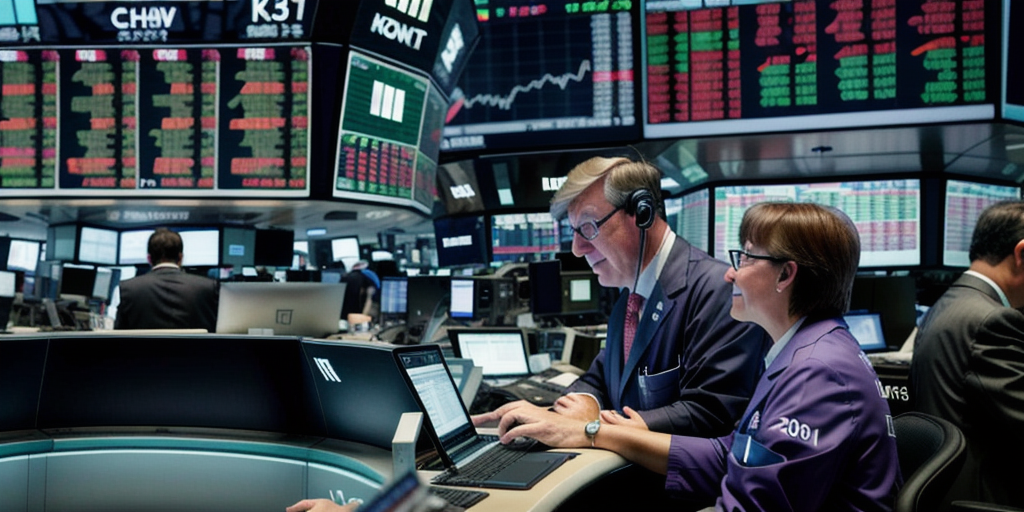
Global stock markets jump after trade deal limits US tariffs on EU to 15%
How did your country report this? Share your view in the comments.
Diverging Reports Breakdown
Global stock markets jump after trade deal limits US tariffs on EU to 15% – business live
European stock markets surged on the opening bell on Monday, a day after US President Donald Trump and European Commission President Ursula von der Leyen, shook hands on a deal in Turnberry, Scotland. The US-EU deal will put a 15% US tariff on most imports from the EU, including cars and computer chips. Steel and aluminium still face 50% tariffs – but only above certain quotas. There are zero tariffs on aerospace parts, some chemicals and raw materials. The EU will also agree to buy $750bn in US energy, and more military equipment – both of which fit with moves since Russia’s invasion of Ukraine in 2022. The deal removes a major source of uncertainty for companies around the world even as it promised a permanent cost to trans-Atlantic goods trade. However, the outcome remains much worse than the situation before Trump started his new round of trade wars early this year.
Please turn on JavaScript to use this feature
I sincerely hope the United States will, in due course, turn away again from the delusion of protectionism and once again embrace the value of free trade – a cornerstone of shared prosperity. In the meantime, Europe must continue to deepen its internal market, cut unnecessary regulation, and forge new partnerships to diversify our global trade network. May Europe become the beacon of open, fair, and reliable trade the world so urgently needs.
This is a moment of relief but not of celebration.
Belgium’s prime minister, Bart de Wever , struck a different tone – firmly placing the blame for tariffs on Donald Trump . He posted on the social network X:
This is not an agreement … Donald Trump ate Von der Leyen for breakfast, this is what happened and we suspected this would happen as the US President is a heavyweight when it comes to negotiations while Madame President is featherweight.
Hungary’s prime minister, Viktor Orbán , has long been one of the most divisive voices within the EU, and he wasted no time in criticising European Commission President Ursula von der Leyen for what he described as a worse deal than the UK managed to secure. According to Reuters, Orbán told a podcast:
Investors might be cheered, but the reaction this morning from European leaders to the EU’s trade deal with the US is decidedly mixed.
24m ago 08.08 BST Global stock markets rise after trade deal averts spiralling EU-US tariffs
Good morning, and welcome to our live coverage of business, economics and financial markets.
Global stock markets have rallied after the US and EU agreed a trade deal, removing a major source of uncertainty for companies around the world even as it promised a permanent cost to trans-Atlantic goods trade.
European stock markets surged on the opening bell on Monday, a day after US President Donald Trump and European Commission President Ursula von der Leyen, shook hands on a deal in Turnberry, Scotland, on Sunday. Germany’s Dax rose 0.8% in early trading, France’s Cac 40 gained 1%, while Spain’s Ibex gained 0.8%. The FTSE 100 in London gained 0.5%.
Asian stock markets also mostly rallied. Australia’s ASX200 rose by 0.4%, Hong Kong’s Hang Seng rose 0.4%, Korea’s Kospi index gained 0.6%, while Shanghai’s CSI300 gained 0.1%. However, Japan’s Nikkei 225 fell by 1% amid doubts over the details of its own trade deal with the US.
View image in fullscreen US President Donald Trump shakes hands with European Commission President Ursula von der Leyen, in Turnberry, Scotland, on Sunday. Photograph: Evelyn Hockstein/Reuters
The US-EU deal will put a 15% US tariff on most imports from the EU, including cars and computer chips. Steel and aluminium still face 50% tariffs – but only above certain quotas.
There are zero tariffs on aerospace parts, some chemicals and raw materials. The EU will also agree to buy $750bn in US energy, and more military equipment – both of which fit with moves since Russia’s invasion of Ukraine in 2022.
There is good news and bad news in the deal, said Holger Schmieding, chief economist at Berenberg, an investment bank:
The crippling uncertainty seems to be largely over. The trade deal which the US and the EU struck in Scotland on Sunday with a 15% tariff on most US goods imports from the EU is bearable for the EU, much more so than the 30% tariff would have been which US president Donald Trump had threatened before. However, the outcome remains much worse than the situation before Trump started his new round of trade wars early this year. The extra US tariffs will hurt both the US and the EU. […] The trade tensions with the US will subtract a cumulative 0.3 percentage points from European and 0.5 percentage points from German growth in 2025 and 2026 taken together. The deal is asymmetric. The US gets away with a substantial increase in its tariffs on imports from the EU and has secured further EU concessions to boot.
The agenda
